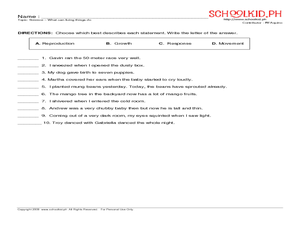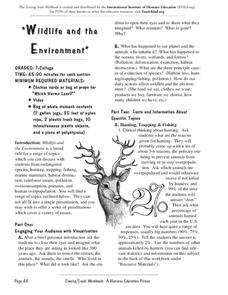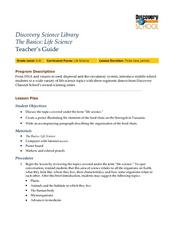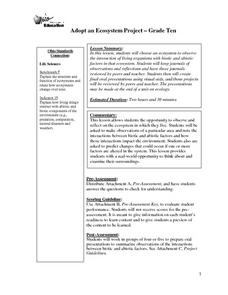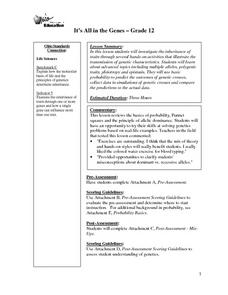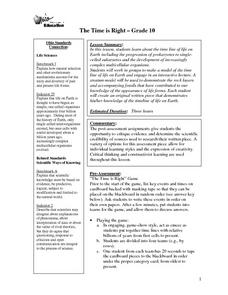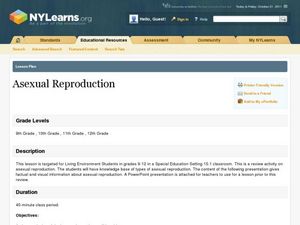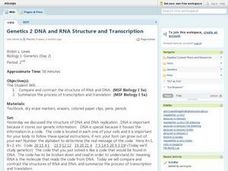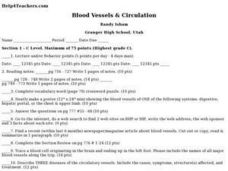Curated OER
Students Solutions - Saving Our Surroundings
Pupils explore the environmental impact of humans on the plants and animals in their state. In this environmental impact lesson, students use digital cameras to photograph plants and animals in their state. Pupils investigate the animal...
Curated OER
In the Field with Salamanders
Students observe salamanders, take pictures of them, and classify them into an online format. In this animal classification instructional activity, students use collection materials and digital camera to photograph and observe...
Curated OER
What is a Living Thing, and How Does a Living Thing Respond to Its Environment?
Students investigate how living things interact with their environment. In this living things lesson, students complete lessons for science investigations on what living things have in common. Students study cells, complete...
Curated OER
What Does Life Look Like Under a Microscope?
Learners discover cells make up all living things. In this life science lesson plan, students investigate living organisms and the cells that create them. Finally the learners create a testable question, conduct an investigation, and...
Curated OER
Science - What Can Living Things Do
In these living things worksheets, learners write true or false for the sentences about living things. Students answer the questions about living things and choose the words that best describe the statements about living things.
Curated OER
Bison (American Buffalo)
In this science instructional activity, students read the facts sheet for the buffalo. They could use this for a class activity for classifying animals.
Curated OER
BJU Life Science 5 Word Search
In this word search activity, students locate words related to the life science. The word list includes energy, organ, and necessary.
Curated OER
Environmental Education
In this environment activity, students read about the numerous activities and then take part in participating in one as a teacher or student led project.
Curated OER
The Basics: Life Science
Students develop an understanding of the different fields of study that are encompassed by the term, life science. They view and discuss a video on the topic. In small groups they focus on on of the examples shown in the video to create...
Curated OER
Adopt An Ecosystem
Tenth graders choose an ecosystem to observe the interaction of living organisms with biotic and abiotic factors in that ecosystem. They keep journals of observations and reflections in order to have a resource for further...
Curated OER
It's All in the Genes
Twelfth graders investigate the inheritance of traits through several hands-on activities that illustrate the transmission of genetic characteristics. Students study advanced topics including multiple alleles, polygenic traits,...
Curated OER
The Seven Characteristics of Life
Third graders investigate the characteristics of living and nonliving things. They conduct a research quest in order to identify the seven characteristics of life. Then students pick one aspect and use it to create a song meant to be...
Curated OER
Properties of Soil
Fourth graders conduct investigations to test different types of soil from different regions of Texas. They make comparisons and identify the characteristics of the soil. The end product of the inquiry is a student report.
Curated OER
Lessons of the Lorax
Fifth graders read a story that is about the brown pelicans. Then they use the story narrative in order to apply it to the concept of adaptations in different species. The benefits of certain adaptations is examined.
Curated OER
Patterns and Adaptations in Plants and Animals
Fourth graders conduct research about some of the regions of Texas. They compare plants and animals to identify different adaptations. The statistics of survival rates are measured for changes.
Curated OER
The Time is Right
Tenth graders study the timeline of life on Earth. They learn about the progression of prokaryotes to single celled eukaryotes and the development of increasingly complex multicellular organisms.
Curated OER
Asexual Reproduction
Sixth graders investigate how asexual reproduction produces single-parent offspring. They use plants and yeast to demonstrate vegetative propagation and budding in a laboratory. Students draw five different types of asexual reproduction.
Curated OER
Cell Division and Differentiation
Tenth graders investigate about mitosis, meiosis, and cell differentiation and their purposes and implications in the development and functioning of multicellular organisms. Students use individual journals and a variety of hands-on...
Curated OER
Diversity and Adaptation
Tenth graders explore structure, function and variation among species. Through field observations, lab activities and homework, 10th graders observe and record examples of adaptation and variation.
Curated OER
Energy Extravaganza
Tenth graders study how cells and organisms acquire and release energy through photosynthesis and cellular respiration. They explain that living organisms use matter and energy to synthesize a variety of organic molecules and they will...
Curated OER
DNA and RNA Structure and Transcription
Students compare and contrast the structure of RNA and DNA.They summarize the process of transcription and translation. The instructional activity uses an inquiry model and the use of codes in DNA.
Curated OER
Blood Vessels & Circulation
Learners participate in a layered curriculum designed instructional activity in order to study the cardiovascular system of the human body. The assessments and activities are student centered.
Curated OER
REPRODUCTION
Students complete a variety of activities to study different concepts in Science. The activities are part of a layered curriculum. This is used to differentiate instruction and give a wide variety of assessment opportunities.
Curated OER
DNA and Genes
Students analyze the structure of DNA. They describe how the structure of DNA enables it to reproduce itself accurately. Students discuss genes and the sequence of nucleotides occur in DNA.






